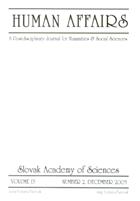SENSUALITY AND SENSE: CULTURAL CONSTRUCTION OF THE HUMAN NATURE
SENSUALITY AND SENSE: CULTURAL CONSTRUCTION OF THE HUMAN NATURE
Author(s): Jaan ValsinerSubject(s): Psychology
Published by: SAV - Slovenská akadémia vied - Slovenská Akadémia Vied - Kabinet výskumu sociálnej komunikácie
Keywords: Human psyche; cultural construction; sexuality; Semiotic Demand Settings;
Summary/Abstract: Human psyche is culturally constructed subjective reality. Sensuality is the starting condition for human adaptation, and it becomes the arena for cultural regulation of the human psyche. Contrary to the traditions of psychoanalysis that have emphasized the unconscious basis for the human psyche, a cultural-psychological analysis concentrates on the transformation of the domain of personal affect into semiotic mediation fields that regulate conduct in toto. Sexuality is only one of the differentiated sub-domains of sensuality, and plays secondary role to culturally organized affect in its multitude of forms. Semiotic mediation of the psychological life-worlds is socially guided—leading to the establishment of the private (personal-cultural) mechanisms of self-regulation is constrained by the Semiotic Demand Settings (SDS) of the collective-cultural input. The SDS set up the ways in which it becomes possible to bring some of the material from the hyper-generalized semiotic fields into focus of social discourse. It operates as a mechanism of social regulation at both the societal level (freedom of speech, paralleled with freedom of not listening) and at the level of individual persons. The role of SDS can be observed in the regulation of scientific discourse itself—the history of enabled talking about sexuality in psychology has led to lack of focus on the person-environment relationships in terms of sensuality.
Journal: Human Affairs
- Issue Year: 2003
- Issue No: 2
- Page Range: 151-162
- Page Count: 11
- Language: English

